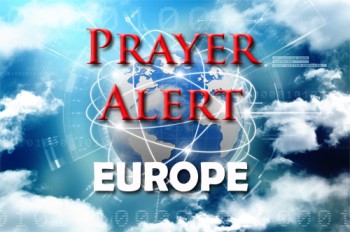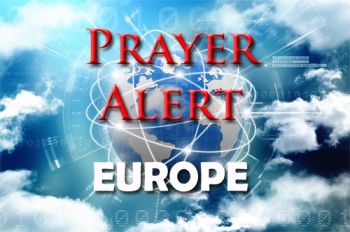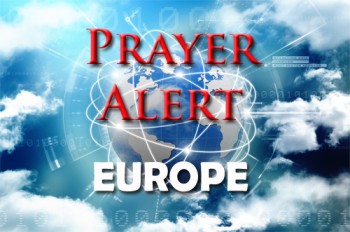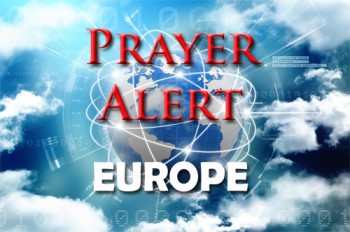Displaying items by tag: Europe
Romania: Prayer for peace of Europe
Between 27 – 29 January prayer leaders from across the nations are in Bucharest, Romania to intercede for an end to the conflict between Ukraine and Russia. This has not been an easy event to facilitate. Some have had spiritual attacks on their lives and families. Please pray for their continued protection after the conference. As we thank God for the relief agencies, churches and governments helping those suffering the consequences of man’s pride and greed, we know that only God’s Spirit, working through His people can bring healing, reconciliation and peace. Pray that every prayer released during this time will resound continually in the coming weeks to bring a lasting peace and reconciliation.
Serbia: Wagner mercenaries recruiting for Russia
A Wagner mercenaries Serbian-language video showing Serb volunteers training to fight alongside Russian troops in Ukraine has outraged Serbia's president Vucic. He said, ‘Why do you, Wagner, call Serbians when you know it is against our rules?’ So far, Serbia has prioritised Russian friendship over ambitions to join the EU, but now Belgrade lawyers and anti-war groups have filed criminal complaints against Russia’s ambassador and Serbia's state security and information agency for recruiting Serbians for Wagner. Vucic said, ‘Serbia’s path is towards the West, not towards invading Ukraine. Serbia consistently voted in favour of resolutions at the UN, condemning Russian hostility.’ That stance does not impress MEPs because Serbia refuses to impose sanctions on Russia. MEPs have called for ending Serbia membership negotiations until they agree to sanctions and forego cheap Gazprom gas from Russia.
Ukraine: Corruption crackdown
There have been Ukrainian anti-corruption reforms before, but stakes are higher now that Kyiv is receiving billions of dollars of financial aid from Western allies. Officials are warned through official and unofficial channels: focus on the war, help victims, reduce bureaucracy and stop doing dubious business. Some have not listened. Several senior officials have resigned as Zelensky begins a shake-up of government personnel. A top adviser, four deputy ministers and five regional governors left their posts on 24th January in the broad anti-corruption drive. There are bribery claims worth hundreds of thousands of pounds and officials living lavishly. Zelensky is responding to ‘key public demands’ that justice must apply to everyone and state officials cannot leave Ukraine unless on authorised business. Ukraine is historically corrupt. In 2021 Ukraine ranked 122 out of 180 corrupt countries.
Ukraine: War crimes
A Russian missile strike hit an apartment building in Dnipro housing 1,700 people. President Zelenskyy reported 75 survivors were wounded, at least 40 people died. Rescue efforts continue, but Mayor Borys Filatov said, ‘there is minimal chance of finding others alive. The death toll made it the deadliest attack in one place since September. The attack ends a two-week lull in airstrikes against Ukraine's power infrastructure and urban centres. A Dnipro survivor said, ‘There are no military facilities here, no air defence, no military bases. It just hit civilians, innocent people.’ Russia’s Defence Ministry said, ‘All designated targets on Ukraine’s military command and control system were hit’ see Meanwhile a former commander with the Russian paramilitary Wagner Group has deserted and claiming asylum after witnessing war crimes in Ukraine - including deserters being executed and killing Russians who don't want to kill Ukrainians.
Germany: Defence minister resigns after blunders
Christine Lambrecht was widely criticised for failing to improve Germany's notoriously ill-equipped armed forces despite the provision of €100bn (£88bn) for that task following Russia's invasion of Ukraine. She was mocked for announcing Germany was supporting Ukraine by sending 5,000 military helmets and has resigned following a series of blunders. Ms Lambrecht was due to meet other defence ministers from Ukraine's western allies at the American military base in Ramstein to discuss further support for Ukraine. Berlin is under rising pressure to send Ukraine Leopard 2 tanks - which Ukraine considers vital to defeat Russia - or at least approve their delivery from countries such as Poland. Warsaw signalled its intention to supply the battle tanks but requires permission from the country of manufacture. Germany’s Vice Chancellor recently said his country would not stand in the way of other nations sending Leopards.
Cost of living
The cost-of-living crisis triggered by the Ukraine war, the energy crunch, surging inflation and the coronavirus pandemic has become the greatest worry for EU citizens, according to a new Eurobarometer showing 45% of respondents are currently having some or a lot of difficulties with their personal income. The poll speaks of a ‘polycrisis mood’ across the continent. Additionally, 46% of Europeans admit their standards of living have already decreased as a result of the mounting crises, while 39% expect to see a decline sometime this year. More worryingly, 30% of respondents struggle to pay their monthly bills ‘from time to time’ and 9% say this is the case ‘most of the time.’
Ukraine: controlling Soledar matters
Russia has not taken a key position for months, despite intense efforts to achieve military gains. Wagner claims to have Russian mercenaries in control of a Soledar salt mine. But the regular Russian armed forces and Moscow defence ministry say the battle is still going on, hinting of a rift in pro-Russian forces. Ukraine also says there is still fighting there. Soledar’s deep salt mines could be used to position troops and equipment while being protected from Ukrainian missiles, and the tunnel network could be used to penetrate Ukrainian-controlled territory. The salt and gypsum mines provide sources of revenue for whoever works them. Wagner mercenaries have previously taken control of valuable African mining resources. Soledar’s battle is just one in a campaign that is not going well for Putin. If Russia seize Soledar the course of the war could change and Putin gain a propaganda win to present to his critics.
Ukraine: Putin should face trial in 2023
The British barrister Sir Geoffrey Nice, who led the prosecution of former Serbian leader Slobodan Milosevic, said Vladimir Putin should go on trial in Ukraine this year for war crimes committed there. He expressed his surprise that prosecutors and politicians were not ‘spelling this out much more freely and openly’. He described Moscow's actions during the invasion as ‘crimes against humanity’ as civilian targets were being attacked. Crimes against humanity are considered the most serious offences under the so-called ‘rules’ of war. These laws ban attacks on civilians - or infrastructure vital to their survival - and are set out in international treaties such as the Geneva Conventions. Russia's repeat attacks on the Ukrainian energy grid over the winter are described as war crimes because of the harm done to civilians. Russia claims to be hitting only military targets. Kyiv’s prosecutor-general has reported 62,000+ war crimes, including over 450 child deaths.
Germany: 2023 prayer needs
There is a shortage of skilled workers in the hotel industry, maintenance and repair, health and safety services, day care centres and schools. Nationwide there are 100,000 child care and 40,000 teacher positions vacant. There are many causes: higher birth-rate, immigration, increase in all-day care services, increasing requirements for social inclusion and language training, and inadequate preparation for the large number of workers from the 1960s baby-boom generation who will retire in the 2020s. Teachers, trainers, educators and carers, under stress due to heavy workloads, are taking time off due to illness. Germany’s education system needs a fundamental overhaul to equip children for life in the coming decades. Many of the teaching methods and educational materials are antiquated and no longer suitable to give children a healthy identity, self-confidence, assertiveness, team spirit, joy and resilience for the demands of the current world.
Ukraine: dance of defiance
Dressed in the colours of Ukraine, Vladyslav Bondar, a ballet dancer, moves delicately across the stage of Rotterdam's mediaeval St Lawrence Church. He is performing with the United Ukrainian Ballet at a Salvation Army Christmas party - a setting far removed from the war in his homeland. ‘I wanted to fight for Ukraine.’ Vladyslav said after the performance, knowing it could have meant the end of his career as a professional dancer. But instead of taking up arms, he joined over 70 other Ukrainians who make up the United Ukrainian Ballet - a dance company formed directly in response to the outbreak of war. Fellow dancer Oleksii Kniazkov said, ‘Every Ukrainian has his own battlefield. And the stage is ours.’ Their dance is a dance of defiance.









